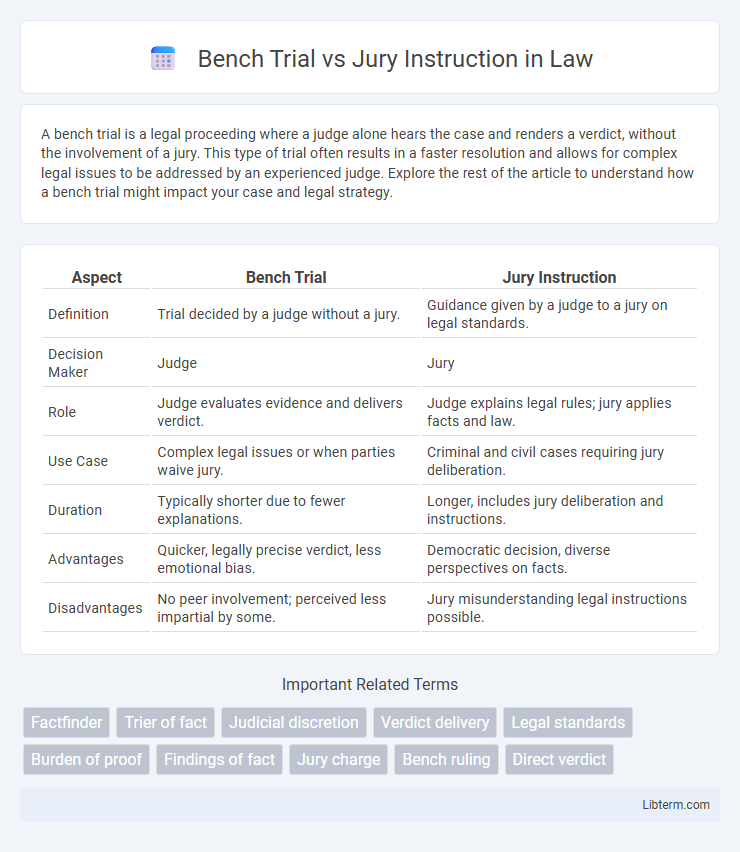A bench trial is a legal proceeding where a judge alone hears the case and renders a verdict, without the involvement of a jury. This type of trial often results in a faster resolution and allows for complex legal issues to be addressed by an experienced judge. Explore the rest of the article to understand how a bench trial might impact your case and legal strategy.
Table of Comparison
| Aspect | Bench Trial | Jury Instruction |
|---|---|---|
| Definition | Trial decided by a judge without a jury. | Guidance given by a judge to a jury on legal standards. |
| Decision Maker | Judge | Jury |
| Role | Judge evaluates evidence and delivers verdict. | Judge explains legal rules; jury applies facts and law. |
| Use Case | Complex legal issues or when parties waive jury. | Criminal and civil cases requiring jury deliberation. |
| Duration | Typically shorter due to fewer explanations. | Longer, includes jury deliberation and instructions. |
| Advantages | Quicker, legally precise verdict, less emotional bias. | Democratic decision, diverse perspectives on facts. |
| Disadvantages | No peer involvement; perceived less impartial by some. | Jury misunderstanding legal instructions possible. |
Understanding Bench Trials: A Brief Overview
Bench trials involve a judge who serves as the sole fact-finder, evaluating evidence and legal arguments without a jury. This process allows for a more streamlined proceeding, often resulting in quicker resolutions compared to jury trials. Understanding how judges interpret and apply legal standards during bench trials is crucial for grasping their impact on case outcomes.
The Role of Jury Instructions in Criminal and Civil Cases
Jury instructions play a crucial role in both criminal and civil cases by guiding jurors on legal standards and the application of law to facts. These instructions clarify elements such as burden of proof, definitions of legal terms, and applicable laws to ensure jurors deliver verdicts based on accurate legal understanding. Properly crafted jury instructions minimize misunderstandings and enhance the fairness and accuracy of trial outcomes.
Key Differences Between Bench Trials and Jury Trials
Bench trials are conducted solely by a judge who evaluates evidence and renders a verdict, offering a faster process with less formality than jury trials. Jury trials involve a group of citizens who assess evidence and determine guilt or innocence, introducing a wider range of perspectives and potential unpredictability. The key differences lie in decision-making authority, trial duration, and the involvement of community members in the legal process.
Advantages of Choosing a Bench Trial
A bench trial offers the advantage of a faster legal process by eliminating jury selection and deliberation, which often reduces overall trial duration. Judges possess specialized legal expertise, enabling more precise interpretation of complex legal issues and rules of evidence. Confidentiality is enhanced in bench trials, as proceedings are less public and shielded from potential jury bias or emotional influence.
Potential Drawbacks of Bench Trials
Bench trials may pose potential drawbacks such as a higher risk of perceived judicial bias, as the judge acts as both fact-finder and legal arbiter without input from a jury. Limited perspectives during bench trials can result in less diverse deliberation compared to a jury composed of peers, potentially affecting the fairness of verdicts. Furthermore, bench trials may reduce community participation in the justice process, impacting public perception of transparency and legitimacy.
Importance of Jury Instructions in Ensuring Fair Trials
Jury instructions are critical in guiding jurors on legal standards and the appropriate application of the law, ensuring their decisions are based on accurate interpretations. Clear and precise instructions help prevent misunderstandings, reduce bias, and promote consistency in verdicts, which is essential for upholding justice. The absence or inadequacy of jury instructions can lead to appeals and mistrials, highlighting their vital role in fair jury trials compared to bench trials where judges rely on legal expertise to render judgments.
How Judges Interpret Law in Bench Trials
In bench trials, judges apply legal principles directly to the facts without jury involvement, interpreting statutes and case law to determine outcomes. They utilize detailed legal knowledge and precedent to assess evidence and resolve factual disputes efficiently. This judicial interpretation ensures rulings are grounded in rigorous legal analysis, distinguishing bench trials from jury trials where laypersons weigh facts guided by jury instructions.
The Impact of Jury Instructions on Verdicts
Jury instructions critically shape how jurors interpret legal standards, directly influencing verdict accuracy and consistency. Clear, precise instructions reduce misunderstandings and minimize biased or erroneous decisions, enhancing trial fairness. Studies show that well-crafted jury instructions correlate with higher conviction appropriateness and fewer wrongful acquittals or convictions.
Factors to Consider When Choosing Bench Trial or Jury Trial
When deciding between a bench trial and a jury trial, consider factors such as the complexity of legal issues, the emotional elements of the case, and the potential biases of a jury. Cases involving intricate legal interpretations or technical evidence often benefit from a bench trial with a judge skilled in the area of law. Jury trials may be preferable when the case appeals to community standards or sympathy, but the unpredictability of jury decisions should also be evaluated carefully.
Bench Trial or Jury Trial: Which is Right for Your Case?
Choosing between a bench trial and a jury trial depends on the complexity of legal issues and the nature of the case. Bench trials, decided solely by a judge, can be faster and more predictable, especially in cases involving intricate legal matters or where emotional bias may influence jurors. Jury trials provide a broader perspective with community involvement but may introduce unpredictability due to jurors' interpretations and biases.
Bench Trial Infographic

 libterm.com
libterm.com